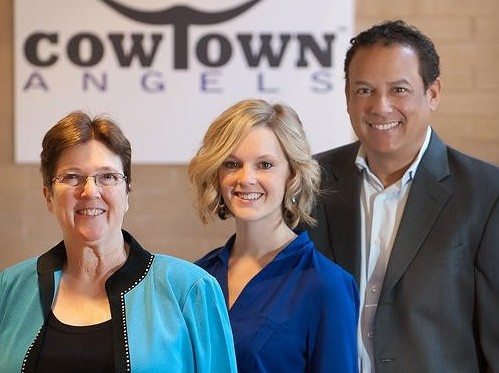By Steve Kaskovich
Fort Worth Star-Telegram.
FORT WORTH
‘Tis the season for angels. But in the Fort Worth business community, angel investors are making year-round appearances.
For the past two years, a group of local investors called the Cowtown Angels has been meeting regularly, hearing pitches from up-and-coming entrepreneurs in need of seed money for their fledgling ventures.
Think of it as Fort Worth’s version of Shark Tank, the popular ABC show starring Mark Cuban, but with less conflict and self importance, and more collaboration.
So far, the group of finance professionals, retired executives, entrepreneurs and members of wealthy families has pumped more than $6 million into about a dozen promising companies, including a local company that developed sprayer technology used to disinfect apartments of Ebola victims in Dallas and another developing an eye treatment to help adults avoid reading glasses.
The angel investor group was the brainchild of Darlene Boudreaux, executive director of Tech Fort Worth, the business incubator located at the old James E. Guinn school south of downtown. Tech Fort Worth provides startups with a variety of services such as counseling on business plans, marketing and legal issues as well as offering office space.
A successful entrepreneur herself who built up and sold the Grand Prairie drug manufacturer PharmaFab, Boudreaux saw a need to connect entrepreneurs with local investors. She first launched the North Texas Angel Network out of Tech Fort Worth, but it mostly attracted investors from Dallas and eventually split off on its own.
Boudreaux then decided she needed to attract Fort Worth investors to support local startups, and the Cowtown Angels group was born. It’s part of a growing network of such groups throughout Texas, which typically fill funding needs for startups after they’ve exhausted capital raised from family and friends.
Currently, the group has about 30 members, who meet monthly at UT Arlington’s Fort Worth Center, in the old Santa Fe freight building on the edge of downtown. Investors hear short presentations from a handful of companies before deciding whether to invest.
On a November afternoon, five companies came before the Cowtown Angels pitching new products in fast-growing areas such as social media and virtual reality, seeking investments that ranged from $300,000 to $2.5 million.
The investors peppered them with questions about marketing plans, potential competition and sales goals, and later voted to move forward with two. Each was invited back for an hourlong “deep-dive” session with a more detailed assessment of their business.
Then the group conducts a formal due diligence process before any investment is made.
“They really care about our community,” said Boudreaux of the local investors. “They will see companies from all over Texas. But when there’s a Fort Worth company, they care the most. They probably give them the benefit of the doubt moving forward.”
Les Kreis, a 43-year-old Fort Worth native and professional investor who was a founding member of the group, said he’s interested in promoting economic growth in his hometown as well as making money.
Generally, Kreis says, he’s looking for opportunities where he can make 10 times his money in five years. Not all early-stage companies will pan out, he said, so angel networks make a number of small investments to spread the risk. That way, if half of the investments end up as zero, the winners make up for it, he said.
Being part of a group also allows investors to share their expertise. So while a physician can evaluate the viability of a new drug, a finance expert like Kreis can provide an accurate valuation. Unlike on Shark Tank, where the show’s investors compete with each other to snag the best deal, angel investors work together and each decides whether to put money into a venture, which is then pooled from the Cowtown Angels.
“It is, in my opinion, an exercise in collective capitalism,” said Kreis, for worked for 12 years at HBK Investments in Dallas before launching his own firm, Steelhead Capital Management. By working together, “we believe it will enhance our ability to have more positive returns.”
The investor group often takes a board position with the company to gain an ongoing involvement and protect its investment. For example, after the Cowtown Angels decided to invest in E-Mist Innovations, which developed technology for the Ebola sprayer gun, one of the investors, George Robertson, joined the company as its CEO.
One local company that Kreis has backed is Encore Vision, which is developing eye drops to treat presbyopia, the condition that causes people to need reading glasses. Altogether, Cowtown Angels has provided $1.25 million for Encore, which has raised nearly $10 million thus far.
Bill Burns, a former executive with Alcon Labs who is Encore’s president and CEO, said the company has developed a compound designed to soften the lens in the eye, which could help as many as 100 milion people globally who suffer from presbyopia. The company hopes to launch its first human clinical trials early in 2015.
Encore has been a client company at Tech Fort Worth for several years, which also provides lab space at the University of North Texas Health Science Center. Burns says the incubator and the Cowtown Angels have been instrumental in the company’s development.
“It’s a huge contribution to the Fort Worth area,” he said. “Tech Fort Worth and the UNT Health Science Center create an environment where someone with an invention and idea can get the help they need.”
Burns, who has pitched to many investment groups while seeking funding for Encore, said he was impressed with the varied background of the Cowtown Angels investors, from pharmaceuticals to finance.
“The nice part of this group is that they’re local and they have an interest in seeing firms that have promise in the community succeed,” he said.














































































































































































































































































































































































